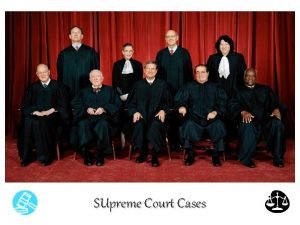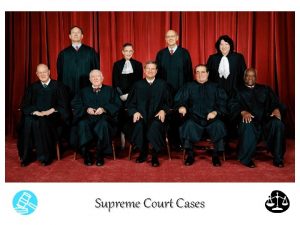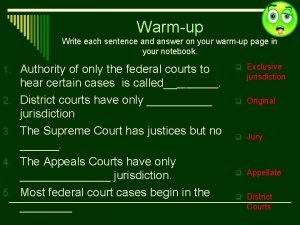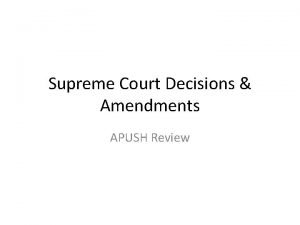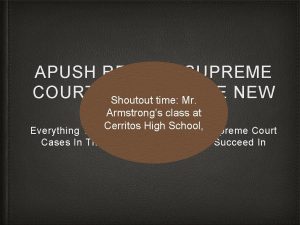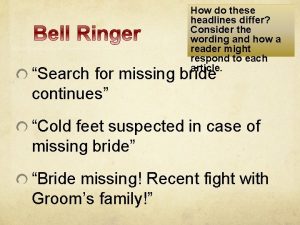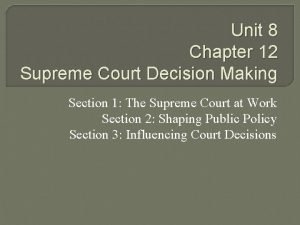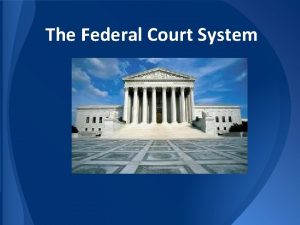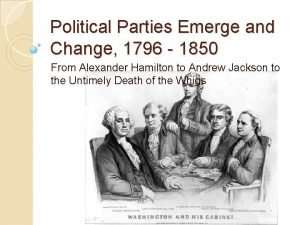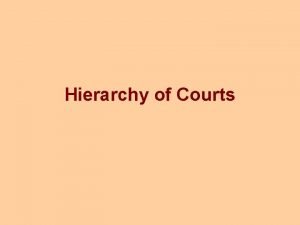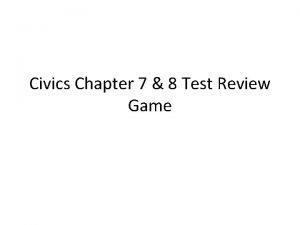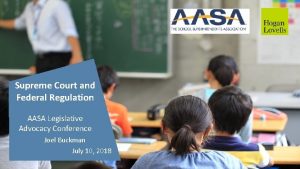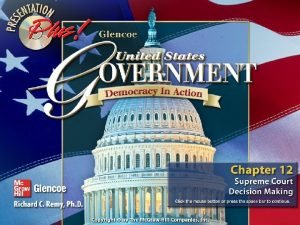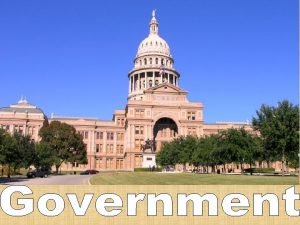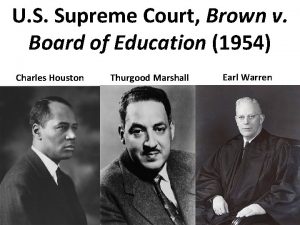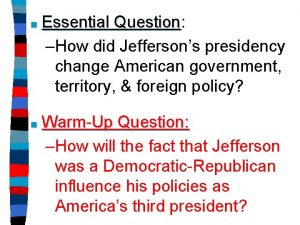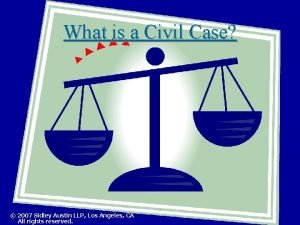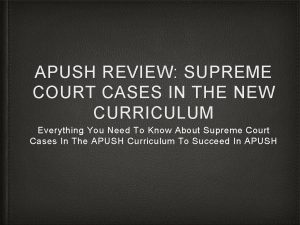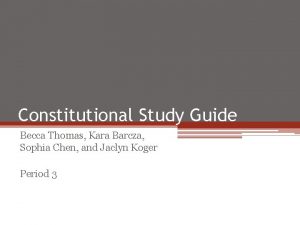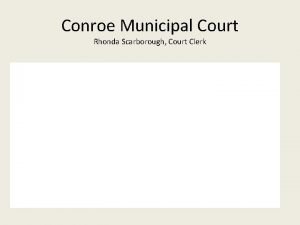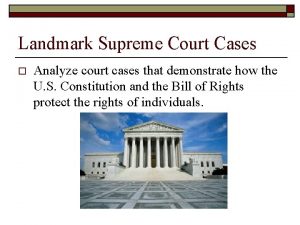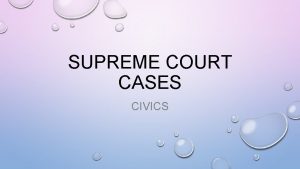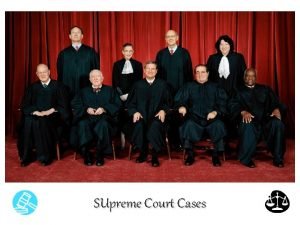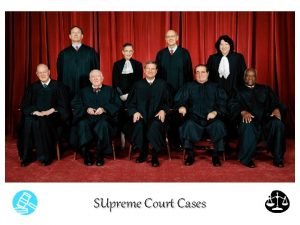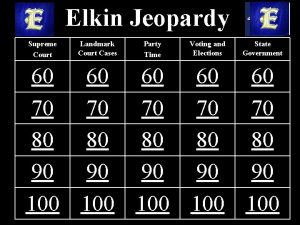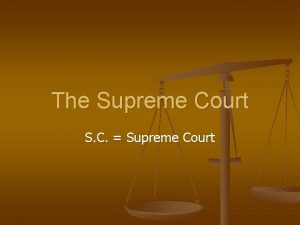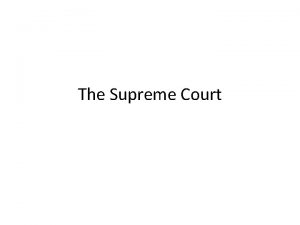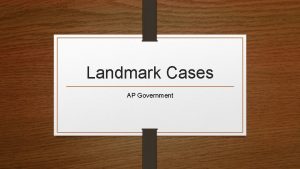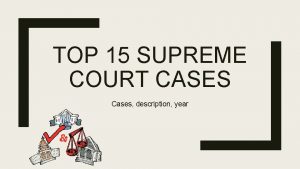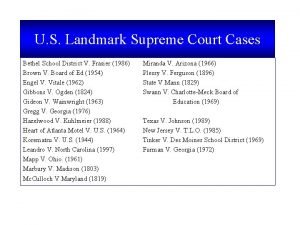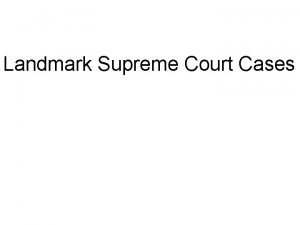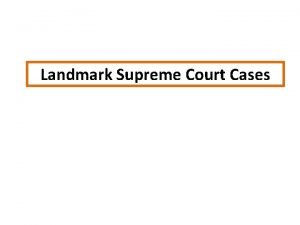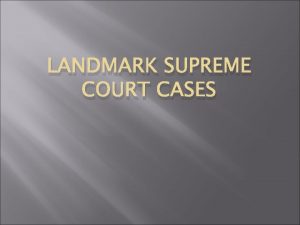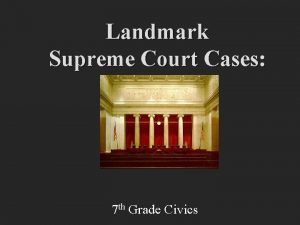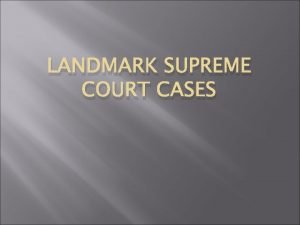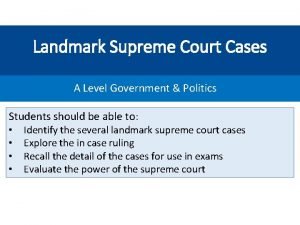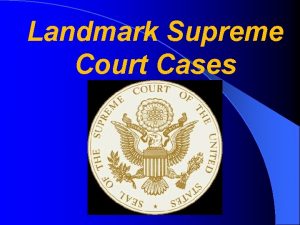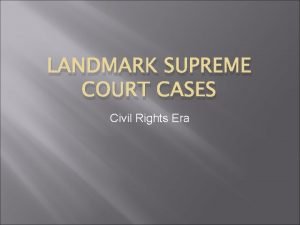Top 10 Landmark Education Supreme Court Cases And
























- Slides: 24

Top 10 Landmark Education Supreme Court Cases And what that means for you… (In no particular order)

First Amendment—Free Speech of Students 1. Tinker v. Des Moines, (1969) Issue: Do students have a constitutional right to wear arm bands in school as a form of symbolic speech to protest the Vietnam War? Decision: The First Amendment rights applied because neither “students or teachers shed their rights at the school house gate. ” Schools must be able to show that students conduct would “materially and substantially interfere” with the operation of the school. ”

So what about… • Nazi insignia drawn on a student’s cast? • Tattoos on teachers? • T-shirts that say “I support Coach Adams” who was suspended for being too aggressive with his players?

Another Free Speech Case 2. Hazlewood v. Kuhlmeier (1983) Issue: May public school officials impose some limits on what appears in a school-sponsored newspaper? Decision: Yes. School officials can censor nonforum student newspapers when they can justify their decision by stating an educational purpose

And Another Free Speech Case 3. Bethel School District #43 v. Fraser (1987) Issue: Does the First Amendment protect a student’s right to deliver a vulgar and offensive speech at a school assembly? Decision: No. The Supreme Court distinguished that sexually explicit speech is not protected under Tinker. “A high school assembly or classroom is no place for a sexually explicit monologue directed towards an unsuspecting audience of teenage students. ”

So what about… • A banner that says “Bongs for Jesus” • Lewd or offensive speech on Facebook/Myspace/personal blogs? • Threatening speech on off-campus itnernet sites?

First Amendment Establishment Clause Cases (ie, Prayer in Schools) 4. Lee v. Weisman (1992) Issue: Can schools sponsor prayer at graduation ceremonies? Decision: No. The Supreme Court concluded unequivocally that school officials or employees offering prayers as part of the commencement exercises is unconstitutional.

More Prayer in School 5. Santa Fe Independent School District v. Doe, (2000) Issue: Is a policy permitting student-led, student-initiated prayer at football games in violation of the Establishment Caluse? Decision: Yes. The Court held these pre-game prayers delivered "on school property, at school-sponsored events, over the school's public address system, by a speaker representing the student body, under the supervision of school faculty, and pursuant to a school policy that explicitly and implicitly encourages public prayer" are not private, but public speech.

So What About… • Religious songs at graduation? • Recitation of the Lord’s prayer at a commencement that was offered spontaneously and without preparation by a member of the State School Board? • Prayers over the food offered by coaches at athletic end of year banquets? • Prayers over the food offered by students at end of year banquets?

Fourth Amendment Searches of Students 6. New Jersey v. T. L. O. , (1985) Issue: Can school officials search students? Decision: The U S Supreme Court stated that searches and seizures may be conducted by school officials based upon "reasonable suspicion. " "a school official may properly conduct a search of a student's person if the official has a reasonable suspicion that a crime has been or is in the process of being committed, or reasonable cause to believe that the search is necessary to maintain school discipline or enforce school policies. "

NOTE Both the reason for the search AND the appropriateness of the scope of the search must be reasonable – For example, the school official must have reasonable grounds for expecting that the search will turn up evidence that the student has violated the law or rules of the school AND – The breadth of the search should be reasonably related to the objectives of the search

Reasonably Suspicious Circumstances? • A student’s bulging pockets • Student’s flushed fact, glassy and red and bloodshot eyes • Student looked stoned, smelled of marijuana and was incoherent • Student made furtive gestures and had “obvious consciousness of guilt” • Student gave evasive statement, used profane language and gave false names • Student’s record of concealed weapons plus suspicious behavior • Student’s history, suspicion, or appearance of drug use

• Students entered a school bathroom where others had been arrested for possession and students acted as look-outs • Student’s presence in a school bathroom w/o a pass, together with student’s faltering and nervous behavior —school restrooms frequent scenes of narcotic activities • Student out of class and in a prohibited area w/o a pass • Student in an immediate vicinity of an incident together w/ a suspicious reaction when questioned • Observation of students smoking and/or the odor of marijuana • Drug paraphernalia seen through car window of student’s car

• Observation of a request to sell drugs or of several pill sales • Overhearing student’s conversation about drinking beer at school • Small of marijuana from students, students’ hotel rooms • Admission by a student that he had illegal items in his backpack • Student threats of crime or violence • Information from reliable student informants

WHAT can be searched? • Searches of students: – Body searches? Should be infrequent. • More often, searches are limited to student’s pockets, outer clothing, bags, or belongings. – A “pat-down”? May be justified and is a comparatively slight invasion of a student’s privacy. • Age of students, necessity for search and nature of items being searched for should be evaluated prior to touching students – Strip searches? Rarely justified

(WHAT can be searched, cont. ) • Searches of pockets, clothing, bags and effects – Usually justified and upheld by courts – Search must be reasonable in scope. Ie, an Oregon court did not uphold a search of a student’s jacket for a weapon when the search was continued to look for drugs • Searches of places, things – Lockers: usually allowed, especially if school board policies express joint control of lockers – Motor vehicles: yes, if on school property. Best if there’s a policy that allow parking permits on the basis that cars may be searched based on reasonable suspicion. Off campus cars not as easy to search

(WHAT Can Be Searched, cont. ) • Urinalysis drug testing? 7. Veronia School District v. Acton (1995) Issue: Is it a violation of the 4 th Amendment to subject student athletes to random drug testing? Decision: No. The Veronia student athletes were the leaders of the drug culture at the school; it was "self-evident" to the Court that "a drug problem largely fueled by the 'role model' effect of athletes' drug use, and of particular danger to athletes, is effectively addressed by making sure that athletes do not use drugs. "

(WHAT, cont. ) • Electronic devices? • Drug-sniffing dogs? • Surveillance and videotaping of students – Patrolling school parking? School smoking area? Student common area? OK. – Locker rooms? Not OK. – Classrooms? Maybe not.

Fifth and Fourteenth Amendment Cases: Due Process for Students 8. Goss v. Lopez, (1975) Issue: Can schools suspend students without due process? Decision: Students cannot be suspended without a hearing before the suspension. Students who are suspended for 10 days or less are entitled to certain rights before their suspension. These rights include an oral or written notice of the charges, an explanation, if students deny the charges, of the evidence against them; and an opportunity for students to present their side of the story

How much due process is due? For suspensions of 10 days or less: • Notice of charges. – “Sandy, I think you were smoking in the girls’ restroom. ” • Summary of evidence. – “I saw you, and you smell strongly of cigarette smoke. ” • Opportunity to respond. – “Do you have an explanation for your actions? ” • Administration of disciplinary action, following state requirements to notify parents without delay. For longer suspensions or expulsions, a more formal hearing including witnesses, evidence, and the opportunity for counsel is required

Eighth Amendment Cases: Corporal Punishment? 9. Baker v. Owen, (1975) Issue: Can school administrators administer corporal punishment against parental wishes? Decision: Yes. The Court established guidelines for administering corporal punishment determining that students must be warned in advance, other forms of behavior modification must be tried, only reasonable force can be used, parents must be notified and there must be an adult witness.

And More on Corporal Punishment 10. Ingraham v. Wright (1977) Issue: Does paddling of a student violate the 8 th Amendment? Decision: No. Teachers and administrators can paddle for the proper education and discipline of the student but punishment beyond this privilege may result in liability.

HOWEVER…. . Utah, along with 31 other states, have specific laws or rules prohibiting the use of corporal punishment in schools. IT IS NOT OKAY TO HIT STUDENTS!

What about… • Dragging a completely belligerent and obstinate 10 year old child down the hallway to the office because she won’t stand up to walk herself? • Putting tape on a student’s mouth to keep him quiet? • Taking a student by the necktie and lifting him off the floor when he continued to push your buttons? • Hitting a student who was late to class and disruptive with a hockey stick and threatening to kill him?
 Insular cases apush
Insular cases apush Cohens vs virginia apush
Cohens vs virginia apush How cases reach the supreme court worksheet answers
How cases reach the supreme court worksheet answers Important amendments apush
Important amendments apush Schechter vs us apush
Schechter vs us apush Is there a basketball court above the supreme court
Is there a basketball court above the supreme court What do these headlines say about how the supreme court
What do these headlines say about how the supreme court Vocabulary activity 12 supreme court decision making
Vocabulary activity 12 supreme court decision making Us circuit court map
Us circuit court map The supreme court change
The supreme court change Jurisdiction of supreme court
Jurisdiction of supreme court The u.s. supreme court works chiefly as a(n)
The u.s. supreme court works chiefly as a(n) Supreme court does
Supreme court does Supreme court does
Supreme court does Have supreme court
Have supreme court Indictable offence
Indictable offence Supreme court
Supreme court Supreme court
Supreme court Which precedent was established by the supreme court
Which precedent was established by the supreme court John marshall supreme court
John marshall supreme court John marshall supreme court
John marshall supreme court Criminal cases vs civil cases
Criminal cases vs civil cases Court cases apush
Court cases apush 15th amendment importance
15th amendment importance Scarborough court cases
Scarborough court cases
